If you have favorite books you’d like us to consider, please feel free to contact us at hello@raisinglittlegiants.com.

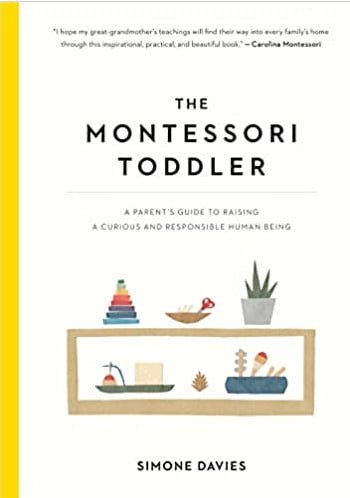
With the Montessori approach to education gaining increasing notoriety, “The Montessori Toddler: A Parent’s Guide to Raising A Curious and Responsible Human Being” (Workman Publishing, 2019) serves as a nice primer on the basic principles and practices, written by someone who seems to care deeply about these concepts and their practical application. Author Simone Davies, also a parent, blogger, and Association Montessori Internationale certified educator, does a commendable job of making the approach accessible to everyone from the merely curious, to parents who are ready to go all in on the approach. Since a full fledged private Montessori school is outside of the budget of many families, we like how the book offers several ways to introduce the principles in the home, without having to spend a lot of money.
To us, the Montessori principles outlined in the book are more important than the specifics (though the book goes into both). For instance, the importance of the home and learning environments, and the encouragement of natural curiosity are part of the foundation that informs the Montessori approach. But the book delivers for those looking for more detailed, practical applications of these (and other) principles that can be applied in the home on a daily basis.
Questions at the end of each chapter help readers bridge from ideas and concepts to practical application in the home. For those thinking of sending their kids to a Montessori school, there’s a useful list in the appendix of what to look for in a specific school (since the term Montessori is used loosely by some schools). Throughout the books, useful charts lay out information and ideas in ways that make it easy to absorb (such as good activities to do with kids by age).
Well designed and easy to use as a reference, it’s no wonder that the “The Montessori Toddler” has proven popular since its publication.
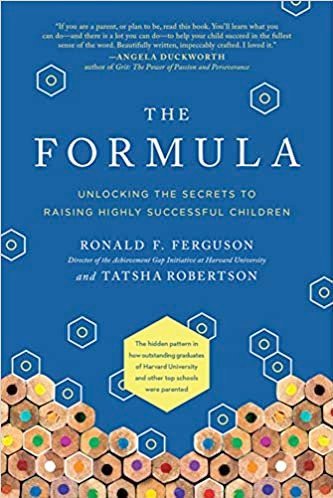
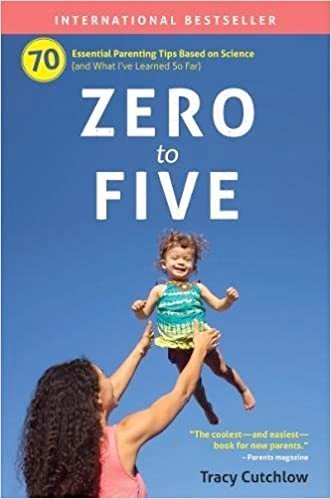
“Zero to Five” is an accessible collection of scientific studies that help inform and provide actionable tips for the parenting of young children. Tracy Cutchlow brings together dozens of studies into an attractive format aimed at the parents from pre-birth, to about five years old. Each page packs a lot in in terms of things parents can practically use. The book is chock-full of good studies and hints ranging from nutrition, to managing stress, to reading time, to TV time, to exercise, to keeping your relationship with your partner healthier, to discipline and more.
Author Tracy Cutchlow uses her extensive background in journalism and research to bring together a rich collection of studies, nicely presented with personal touches and stories, as well as pictures of “real” families. As the author suggests in the introduction, the book is best used as a guide. She quickly points out that she’s not a neuroscientist nor a child development expert. But she’s clearly a professional (and mom) who cares a tremendous amount, and who did an admirable job of bringing together a useful collection of studies and information that help parents at a very practical level. All refreshing, and many are surprisingly useful. We learned several things from the book, as it includes a bunch of information we either didn’t know, or didn’t appreciate enough.
We have the spiral-bound edition, and enjoy the format for absorbing this type of information. Key takeaways are presented in a succinct fashion, and we thought that the pictures of real families were a nice touch.
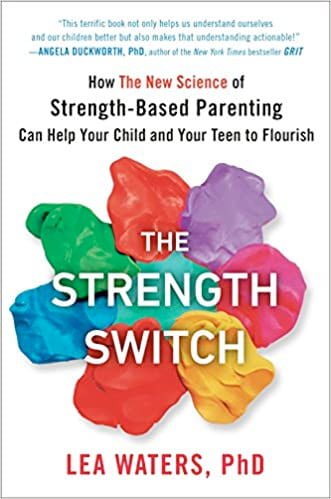
We’re fans of positive psychology and focusing on strengths. So when we came across this book by Lea Waters, PhD applying these ideas to parenting and raising happy, successful children, we knew we had to check it out.
Waters discusses things most of us commonly identify as strengths, such as skills, abilities, and talents, but also others we may not immediately consider, such as interests, characteristics, traits, and talents. She also offers useful frameworks for identifying strengths, such as the three characteristics that strengths share (performance, energy level, and high use).
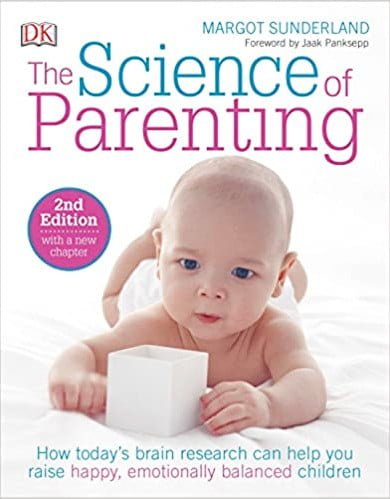
Starting from the perspective of neuroscience and brain research, “The Science of Parenting” offers perspectives, suggestions, and recommendations on everything from sleep, crying, play, the fostering of love and joy, siblings, bullying, social development, discipline, and more.
There are many useful suggestions and ideas in the books that can be applied from before a child is born, to the earliest days after birth, and up through the later childhood years.
A focus on how the brain works and develops, and what this means for healthy interactions with our children at various ages, and corresponding brain and emotional development levels, is what differentiates this book. Helping explain the “why” of how our children act as they do at certain ages is enlightening, and can help deal with stressful parenting situations in the moment.
While the book attempts to be grounded in science, psychology, and studies of the brain, as is often the case, a reader still may not agree with all conclusions (think sleep training, day care choices, discipline, etc.). In many respects, these areas remain personal, situational, and subjective for many parents. Also, studies by other researchers may indicate different conclusions than the author has drawn. However, the book is a useful addition to the many tools, resources, and experiences that help form the basis for how we interact with, and raise, each of our unique children.